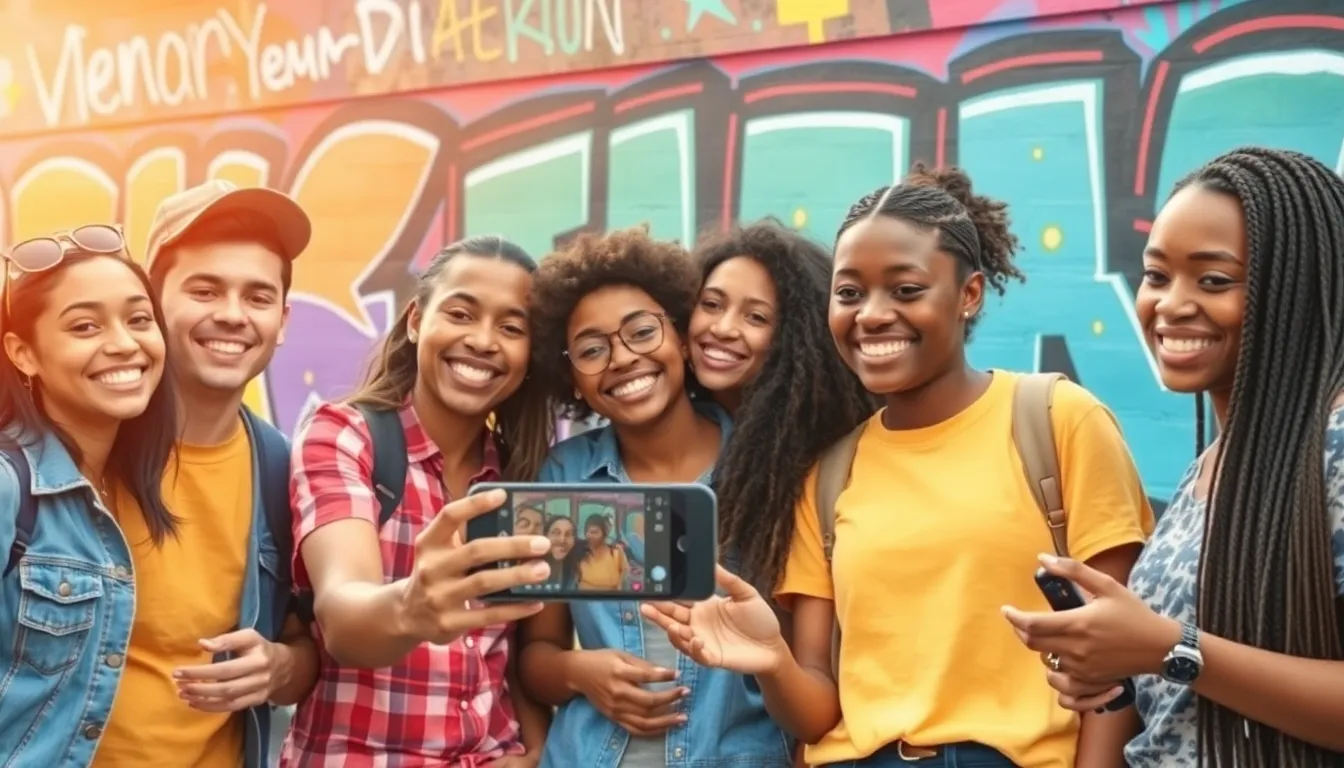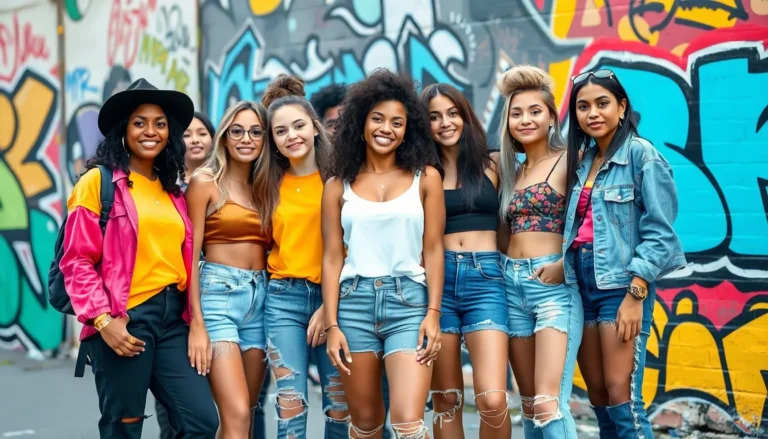Table of Contents
ToggleGen Z is shaking up the social media landscape like never before. Gone are the days of just Facebook and Twitter; these digital natives are flocking to platforms that cater to their unique tastes and preferences. From TikTok’s short, snappy videos to the visual feast of Instagram, Gen Z knows how to make social networking an art form.
Overview of Gen Z Social Networks
Generation Z prefers platforms that emphasize short-form video content and visually rich experiences. TikTok has emerged as a dominant force, attracting millions of users with its creative video formats. Engaging challenges and trending sounds amplify user participation, reinforcing TikTok’s popularity among this demographic.
Instagram remains a key player, especially through its Stories and Reels features, which cater to Gen Z’s desire for connection and storytelling. Photo-sharing and interactive elements such as polls enhance community engagement. The app’s aesthetic focus resonates deeply with Gen Z’s values, promoting self-expression and individualism.
Snapchat continues to thrive, offering ephemeral content that aligns with Gen Z’s need for privacy and spontaneity. Features like Stories and private messaging encourage authentic interactions, making it a favored choice for quick communication among peers.
Emerging platforms like BeReal aim to provide authenticity in social sharing. The app’s concept, encouraging users to capture real-time moments, appeals to Gen Z’s desire for genuine connections. This trend reflects a broader rejection of curated perfection in favor of more relatable content.
Users of Generation Z also explore niche platforms tailored to specific interests. Discord, for instance, serves as a space for community interactions focused on gaming, interests, and hobbies. Such platforms allow for deeper connections built around shared passions, further diversifying their social network experience.
Visual storytelling continues gaining traction in this generation, leading to a shift in how they interact online. New platforms or features often arise to meet Gen Z’s evolving preferences. As a result, the social networking landscape grows increasingly dynamic, adapting to their expectations for engagement and creativity.
Popular Platforms Among Gen Z

Generation Z engages with diverse social media platforms that emphasize creativity and connection. They favor visually driven experiences and short, impactful content.
TikTok
TikTok has solidified its status as a leader among social networks for Gen Z. The platform engages millions with its viral challenges, creative video formats, and music-driven trends. Users often create and share 15 to 60-second videos, making it easy to consume. This format encourages spontaneous participation, leading to a vibrant community. Features like Duets and Stitch enhance collaboration and connection among users. TikTok’s algorithm fosters personalized content discovery, keeping users engaged longer.
Snapchat
Snapchat continues to resonate with Gen Z through its ephemeral content and privacy features. The platform allows users to share moments that disappear after 24 hours, catering to the desire for spontaneity. Unique features like Stories and Snap Map facilitate real-time sharing and interaction. Gen Z appreciates the ability to connect with friends without permanent posts. Creative tools, including AR filters and Bitmojis, enhance user expression and engagement. This focus on authentic moments aligns perfectly with Gen Z’s values.
Instagram retains its appeal with Gen Z due to visual storytelling capabilities. Key features like Stories and Reels cater to the audience’s preference for dynamic content. The platform encourages users to share both polished images and authentic, everyday moments. Unique elements like highlights and IGTV extend content longevity and depth. Engagement thrives through comment sections and direct messaging, promoting social interaction. Gen Z values brand authenticity, influencing their connection to content and influencer partnerships.
Trends Influencing Gen Z Social Network Usage
Gen Z shapes social media trends through preferences for creative expression and community connection. Their choices reflect a desire for dynamic content and genuine interactions.
Content Creation
Platforms focusing on short-form video dominate Gen Z’s content creation landscape. TikTok leads this shift with features that allow users to create engaging 15 to 60-second videos. Functions like Duets and Stitch enable collaboration and creativity among users. Visual storytelling thrives on Instagram, especially within Stories and Reels, where polished and casual content coexists. Gen Z embraces these opportunities to showcase their creativity, making quick, relatable content that resonates with peers. Authenticity drives platform selection, influencing how and what content is shared across social networks.
Community Engagement
Community engagement has transformed in response to Gen Z’s needs. Niche platforms like Discord benefit from focused discussions around shared interests, fostering deeper connections among users. TikTok’s algorithm encourages participation by surfacing content that aligns with user preferences, enhancing community interaction. Snapchat’s ephemeral content appeals by offering privacy and real-time sharing opportunities. Gen Z values immediate connections; therefore, platforms that facilitate interaction and community building gain traction. Authentic engagement remains crucial, driving trends toward meaningful, interactive experiences within social networks.
The Impact of Gen Z on Social Media Marketing
Generation Z significantly influences social media marketing strategies. Their preferences drive brands to adapt and innovate.
Brand Collaborations
Brands increasingly partner with platforms like TikTok and Instagram to reach Gen Z audiences. Collaborations often include unique campaigns that rely on short-form video and vibrant visuals. These campaigns engage users through interactive experiences. For example, branded challenges on TikTok can create viral trends that attract millions. Additionally, co-branded content encourages user participation and enhances brand awareness. Many companies find success in forming alliances with creators who resonate with Gen Z values, such as inclusivity and authenticity. Such collaborations fuel both creativity and audience growth, making them a vital component of marketing strategies focused on this demographic.
Influencer Culture
Influencer culture has transformed marketing practices as Gen Z favors authentic voices. They engage with influencers who reflect personal brand values, creating a sense of connection. Data indicates that 70% of Gen Z is influenced by social media personalities when making purchasing decisions. Influencers often embody diverse perspectives, showcasing products through relatable content. Brands benefit from this trend by leveraging influencer authenticity to enhance their campaigns. Micro-influencers, in particular, have gained traction, as audiences perceive them as trustworthy sources. This strategy not only builds brand loyalty but also fosters community through shared experiences, a critical factor in Gen Z’s social media interactions.
Generation Z is reshaping the social media landscape in ways that prioritize creativity and authentic connections. Their preference for platforms like TikTok and Instagram reflects a desire for engaging content that resonates on a personal level. As brands adapt to these trends they must embrace innovative strategies that align with Gen Z’s values.
The rise of niche platforms and community-focused interactions highlights the importance of fostering genuine relationships. With their unique approach to content creation and consumption Gen Z continues to influence marketing practices and redefine social networking. Staying attuned to these shifts will be crucial for brands aiming to connect with this dynamic generation.







